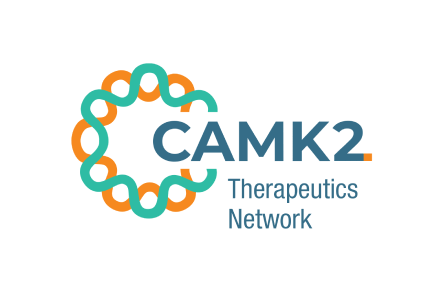CAMK2 Therapeutics Network
Cycle 3
CAMK2 — an abbreviation for calcium/calmodulin dependent protein kinase 2 — is a family of four similar proteins that are abundant in the brain and important for normal electrical signaling. Neurodevelopmental disorders associated with mutations in these proteins were first described in 2017 by Kury and van Woerden et al. Their scientific breakthrough gave a name to the developmental delay, seizures and behavioral abnormalities we had been seeing in our children.
Last updated 04/30/2025
Clinical
Disease Class
Channelopathies
Genetic diseases
Neurological diseases
Body Systems
Nervous / Sensory
Organs
Brain
Heart
Known Genetic Link
Yes, one or more genes directly cause the condition
causative_genes
CAMK2A
CAMK2B
CAMK2D
CAMK2G
contributory_genes
None specified / unknown
Type of Inheritance
Autosomal dominant
De novo
Newborn Screening
No
Disease Mechanism(s)
Abnormal channel conductance
Abnormal channel regulation
Altered channel kinetics
Disorder of calcium signaling
Glutamate pathway malfunction
Ion channel dysfunction
Pathogenic mutation
Age of Onset
Prebirth
Average Age at Diagnosis
Early childhood (age 1+-5)
Life Expectancy
Adolescence (12-17)
Adulthood (age 18-64)
Affected Sex(es)
Female
Male
National Prevalence
101-1000
Global Prevalence
101-1000
National Incidence
Less than 10
Global Incidence
Less than 10
Symptoms / Phenotypes
agitation
autonomic nervous system problems
behavioral changes
cardiac abnormalities
cognitive impairment / confusion / brain fog
developmental delay
gastrointestinal disorders
headaches / migraines
intellectual disability
language impairment
motor regression
movement disorders / ataxia / tremor
seizures / epilepsy
speech delay
Biomarkers
Diagnostic
· Gene sequencing
Existing Therapies
Off-Label Drug Use
Organizational & Research
Cell Lines
iPSCs
Cell Lines, Institution
ENCORE Erasmus MC Sofia Children's Hospital
Gesu Bambino Hospital
Cell Lines, Involvement
Consulted
Funded
Cell Lines, share
No
Disease Model
Mouse
Disease Model, Involvement
Consulted
Disease Model, share
No
Clinical Trial Role
Not involved
Biobank, Institution
ENCORE Erasmus MC Sofia Children's Hospital
Biobank, Involvement
Consulted
Center of Excellence, Institution
ENCORE Erasmus MC Sofia Children's Hospital
Center of Excellence, Involvement
Consulted
Endorsed/Certified/Accredited
Registry
Yes, we have collaborated on a registry
Data Collected, Registry
Clinical data
Electronic health records/electronic medical records
Genetic data
Imaging data
Longitudinal natural history data
Medication usage
Patient contact info
Patient-reported data
Data Entered by, Registry
Clinicians
Platform, Registry
REDCap
Natural History Study
Yes, we have collaborated on a natural history study
Data Collected, Natural History Study
Clinical endpoints (outcomes)
Electronic health records/electronic medical records
Genetic data
Imaging data
Medication usage
Other
Patient-reported outcomes
Prospective data
Platform, Natural History Study
REDCap
FDA Patient Listening Session
No
FDA Patient-Focused Drug Development (PFDD) Program
No
ICD Codes
No, we do not have any ICD codes
Diagnostic Guidelines
No
Science Advisory Board Policies
No policies
Research Network Policies
Has CRN but no policies
Research Roadmap
We don't have a Research Roadmap
International Chapters
None
International Partners
None
